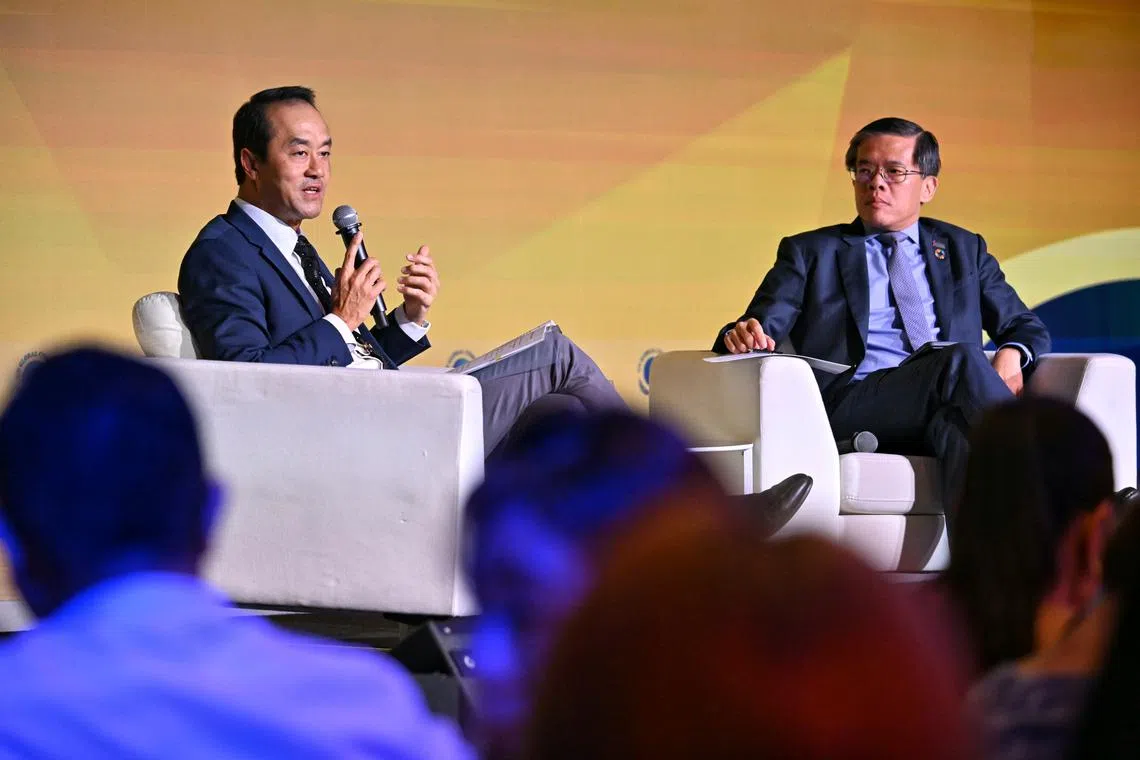New registry helps S’pore firms calculate their carbon emissions more accurately
Sign up now: Get ST's newsletters delivered to your inbox

Dr Koh Poh Koon (left), Senior Minister of State, Ministry of Sustainability and the Environment, with Mr Kok Ping Soon, CEO, Singapore Business Federation, during the fireside chat at the APEX Gala Dinner & Awards Ceremony at One Farrer Hotel on Oct 4, 2024.
ST PHOTO: ARIFFIN JAMAR
Follow topic:
SINGAPORE – Local companies can get more help in calculating their carbon emissions thanks to a new registry launched by the Singapore Business Federation (SBF).
Called NetZeroHub.SG, the free platform helps firms calculate emissions by using around 200 factors that cater specifically to the Singapore context.
The service was announced by Senior Minister of State for Manpower and Sustainability and the Environment Koh Poh Koon at an awards dinner held by the UN Global Compact Network Singapore on Oct 4.
The idea of having a localised registry was first mentioned in April by Minister for Sustainability and the Environment Grace Fu after industry feedback noted that greenhouse gas emissions calculations may not be accurate.
Organisations typically calculate their emissions using factors that look into different aspects of their business, such as the use of fuel, water, building materials and the waste generated.
SBF said that emission factor registries are available in countries such as Britain and the United States, but such data is specific to those countries and may not represent Singapore’s emission profiles.
The Singapore registry was co-developed by the SBF and A*Star, with contributions from Singtel and PwC Singapore.
It allows businesses to access more than 200 factors that can help them calculate their emissions. These cover eight categories: building equipment, building materials, fuel, greenhouse gases, land transport, purchased energy, waste and water.
The data is based on information from four government agencies and the Singapore Green Building Council.
This is especially timely as all listed companies are required to report their Scope 1 and 2 emissions from the 2025 financial year. This refers to emissions from company operations and those from the company buying electricity, for instance.
SBF chief executive Kok Ping Soon said on Oct 4: “By developing a better understanding of their operations and value chains, businesses will be able to identify emission hot spots, and work more effectively towards reducing emissions.”
New emission factors for other activities will be added from 2025, including for logistics, information and communications technology, cleaning and security services.
These are common activities in many Singapore businesses, SBF said, noting that the factors will allow companies to account for their Scope 3 emissions – those that indirectly arise from a company’s value chain.
Ms Aileen Tan, Singtel’s group chief people and sustainability officer, said: “We believe a collaborative approach is needed for the business community to tackle the complexities of measuring and reporting carbon emissions and to achieve more precise climate-related disclosures.”
The NetZeroHub.SG platform also has a resource portal that consolidates sustainability-related information, particularly information that is relevant to Singapore companies.
It caters to all businesses here regardless of size, sector or how far along they are in their decarbonisation journey.
Ms Fang Eu-Lin, PwC Singapore partner, said: “What I see is that this is not just a platform launch; it is also a catalyst for more robust and reliable emissions reporting, which will lead to clearer decarbonisation pathways.
“With more Singapore businesses empowered to make informed decisions and take decisive actions to reduce their emissions, this marks yet another step forward for Singapore in transitioning to a low-carbon economy.”
The awards dinner recognised organisations for their commitment to sustainability and decarbonisation, with Keppel, ComfortDelGro and offshore oil and gas company Dyna-Mac Holdings among those in the winners’ circle.


